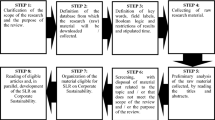Abstract
Environmental education in business school context has a significant effect on the way companies view environmental problems. Business schools train the future decision makers who can, with their own attitudes and practical actions, influence the contribution of business to the process of ecologically sustainable development. However, several studies show that no systematic thinking has been undertaken within business education as to what the educational prerequisites of the process of ecologically sustainable development are. In this article, I will firstly analyze by means of environmental education how business polytechnics in Finland have taken into consideration ecologically sustainable development. Secondly, I will raise the starting points for the development of the implementation of environmental education as part of the business schools▪ educational plans. Integrating environmental education into the vocational courses is identified as being one of the most effective ways of increasing the effectiveness of environmental education. Thirdly, the emphasis is on identification of barriers of integrating environmental education into the educational plans of business polytechnics. Theoretically, the article is attached to the objectives and learning concepts of environmental education and to educational planning theory in general. The empirical data are based on interviews I conducted 1999–2000 in all Finnish polytechnics offering business education. My article increases theoretical and practical understanding of how environmental education should be implemented in business education and how the current situation could be developed.
Similar content being viewed by others
References
Ball S., 1984: Beachside Reconsidered: Reflections on a Methodological Apprenticeship. In: Burges R. (ed.), The Research Process in Educational Settings: Ten Case Studies, pp. 69–98. The Falmer Press, Lewes.
Ballantyne R.R. and Packer J.M., 1996: Teaching and Learning in Environmental Education: Developing Environmental Conceptions. The Journal of Environmental Education 27(2): 25–32.
Becker T.,1997: The Greening of a Business School. The Journal of Environmental Education 28(3): 5–9.
Blackman D.A. and Fleming T.G., 1998a: Environmental Education: Where Does it Fit in Decision-Making? In: Park P.D., Blackman D.A. and Chong G. (eds), Environmental Education and Training, pp. 82–92. Ashgate, Aldershot.
Blackman D.A. and Fleming T.G., 1998b: Why and How Organisations Provide Employees with Environmental Education? In: Park P.D., Blackman D.A. and Chong, G. (eds), Environmental Education and Training, pp. 101–113. Ashgate, Aldershot.
Bragd A., Bridge G., den Hond F. and Jose P.D., 1998: Beyond Greening: New Dialogue and New Approaches for Developing Sustainability. Business Strategy and the Environment 7: 179–192.
Cramer J., 1998: Environmental management: from fit to stretch. Business strategy and the Environment 7: 162–172.
Goetz J.P. and LeCompte M.D., 1984: Ethnography and Qualitative Design in Educational Research. Academic Press, Inc, London.
Greenall A., 1986: Searching for a meaning. What is environmental education? Geographical Education 5(2): 9–12.
Hart S.L., 1997: Strategies for a Sustainable World. Harward Business Review January-February, 67–76.
Hynninen P., 1998: Development of Environmental Education: A Theoretical and Methodological Model for a Sustainable Way of Life. In: Åhlberg M. and Leal W.F. (eds), Environmental Education for Sustainability: Good Environment, Good Life, pp. 287–295. Peter Lang GmgH, Germany.
IUCN. 1980: World Conservation Satrategy. IUCN, WWF, UNEP, Gland, Switzerland.
Linde G., 1993: On Curriculum Transformation: Explaining Selection of Content in Teaching. Doctoral Dissertation at Uppsala University.
Ministry of Education, 2002: Education for sustainable development/ The Baltic 21E Programme. Committee reports 36:2002.
Mrazek R., 1993: Through which looking glass? Defining Environmental Education Research. Alternative Paradigms in Environmental Education Research. North American Association of Environmental Education.
Palmer J., 1998: Environmental Education in the 21st Century. Theory, practice, progress and promise. Routledge, London.
Raumolin J., 2000: Towards Sustainable Education in Finland. A Proposal for Criteria and Indicators for Sustainable Education. Report to the SUSDEED Project. Institute of Development Studies, University of Helsinki, Helsinki.
Rauste-von Wright M., 1994: Opetussuunnitelma ja oppimiskásitys. In Elinikáinen oppiminen. Vapaan sivistystyón 35. Vuosikirja. Kansanvalistusseura ja Aikuiskasvatuksen tutkimusseura, Helsinki.
Rohweder L., 2001: Developing a Curriculum Model of Environmental Education for a Business Polytechnic. In: Houtsonen L. and Tammilehto M. (eds), Innovative Pratices in Geographical Education, pp. 201–207. Helsinki Symposium, August 6-10. Commission on Geographical Education.
Ropo E., 1994: Opetussuunnitelmat ja elinikáinen oppiminen. In Elinikáinen oppiminen. Vapaan sivistystyón 35. Vuosikirja. Kansanvalistusseura ja Aikuiskasvatuksen Tutkimusseura, Helsinki.
Sherman R. and Webb R., 1988: Qualitative Research in Education: Focus and Methods. Falmer, London.
Sinding K., Ulhoi J.P. and Madsen H., 1997: Training and Education of Environmental Managers. Working Paper 97-1. Department of Organization and Management. Faculty of Business Administration, Denmark.
Smith D., Deborath H. and McCloskey J., 1994: Greening the business school. Management Learning 25(3): 475–488.
Stap W.B., 1969: The concept of environmental education. Journal of Environmental Education 1(1): 30–31.
Tilbury D. and Walford R., 1996: Grounded Theory: Defying the Dominant Paradigm in Environmental Education Research. In Michael W. (ed.), Understanding Geographical and Environmental Education. The Role of Research, pp. 51–60. Cassell, London.
Ulhoi J.P. and Madsen H., 1995: The Greening of European Management Education. GMI 10/April: 85–95.
UNCED, 1992: United Nations Conference on Environment and Development. Rio de Janeiro 3-14.6.1992. Agenda 21. Ministry of Foreign Affairs. Political Department. Division of International Environmental Affairs.
Von Wright J., 1993: Oppimiskásitysten historiaa ja pedagogisia seurauksia. Aikuiset ja koulutus 7. Opetushallitus, Helsinki.
Author information
Authors and Affiliations
Rights and permissions
About this article
Cite this article
Rohweder, L. Integrating Environmental Education Into Business Schools' Educational Plans in Finland. GeoJournal 60, 175–181 (2004). https://doi.org/10.1023/B:GEJO.0000033588.66667.0a
Issue Date:
DOI: https://doi.org/10.1023/B:GEJO.0000033588.66667.0a




